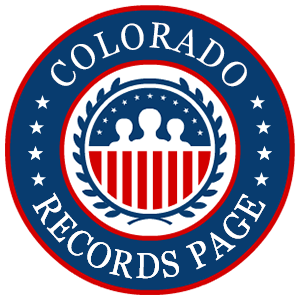Track down free Colorado divorce records in no time using the methods outlined in this resource.
Interested parties have a number of free resources available to assist in their search, and available records often include divorce papers, divorce certificates, and court orders related to alimony and support. Plenty of information can be obtained from these records including the date of the divorce, the names of former spouses, and the court that issued the divorce.
Since divorce laws and procedures vary by state, it’s important to understand the intricacies associated with obtaining divorce records in Colorado, specifically. Colorado also offers some resources that are not as readily available in other regions.
Are Divorce Records Considered Public Records in Colorado?
In Colorado, divorce records are considered vital records. This means that they are not available to all members of the public.
Rather, they can only be requested by individuals with certain relationships to the divorcee. People who can request divorce records include the person’s spouse or former spouse, parent, child, attorney, or other direct relative.
Certain divorce records are not available in Colorado because they have been sealed. An individual may have requested their records be sealed in order to protect their own privacy. If an individual has not asked the court to seal their records, then by default they will be accessible to the qualified parties as described above.
Many older divorce records in Colorado are available. Those interested in such records for genealogical or research purposes can often obtain uncertified copies via online search tools and government databases.
Third party services may be of assistance as well; however, interested parties should note that because these resources are not state-endorsed, the information obtained cannot be used for official purposes.
Census data also provides divorce rates and relevant trends across the state.1 Between 2008 and 2018, the Colorado divorce rate decreased by 3 divorces per 1,000 women.2
How To View Colorado Divorce Records for Free
There are several organizations and departments through which you can obtain divorce records in the state of Colorado. Options are available for inquirers who prefer to make their requests online, in-person, through the mail, and over the phone.
Colorado does provide several state-level resources, and there are also options at the county level. Some of the best options for finding records of marital events are outlined in the following sections.
Colorado Department of Public Health & Environment: Interested parties can request divorce records online through the Colorado Department of Public Health & Environment (CDPHE).
Walk-ins are not available; you must make an appointment prior to your visit. You can make an appointment on the CDPHE website by scrolling down to the bottom of the page.
You’ll see the heading “In-person.” Under the heading, you’ll find a calendar.
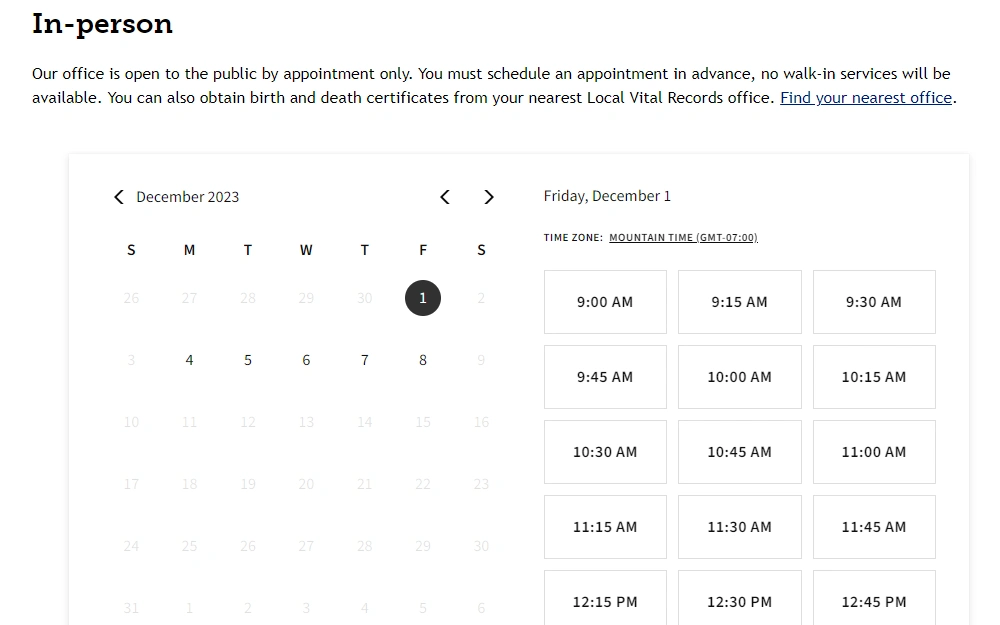
Select a date and a time to schedule your appointment. After choosing a time, you’ll be asked for your phone number and email address on the next screen.
CDPHE requests that you bring a photo ID and proof of your relationship to the person whose records you’re requesting. Proof may be in the form of a birth or marriage certificate, a court order, or an insurance statement. There is a fee of $17 for the first copy of a divorce or dissolution record.
You’ll be charged $10 for each additional copy. If you do not know the date of the divorce, there will be an additional $1 fee per year searched.
The documents provided by CDPHE provide proof of the divorce or dissolution of the marriage, but they do not contain the full divorce record. Such records are available through the district court in the county in which the divorce was finalized.
You can also request certified divorce records by mail via the CDPHE Vital Records Office. Fill out this Application for Certified Verification Dissolution of a Marriage/Civil Union.
You’ll need to provide the name of the person or persons whose records you’re requesting. You’ll also need the county in which their marriage license was granted, the date of their marriage, the purpose of your request, and your relationship to the individual.
Midway down the form, provide your own name and address for shipping purposes. When making a request by mail, there is a fee of $17 for the first certified copy, plus $10 for each additional copy.
There’s also a $6 handling charge. Shipping is free via the U.S. Postal Service Regular Mail, and upgraded shipping options are available for an extra charge. Enclose your application and payment in an envelope, and mail it to:
Vital Record Mail Services
ATTN: Colorado Vital Records
P.O. Box 222130
El Paso, TX 79912
Vital Records does require you to submit proof of your relationship to the person whose records you’re requesting. The requested documents will be mailed to the address you provide.
You can also request divorce records in-person at the Colorado Department of Public Health & Environment:
Colorado Department of Public Health & Environment
Vital Records Office
4300 Cherry Creek Dr.
South Denver, CO 80246
Colorado also uses VitalChek to process and provide records online. To search for Colorado records, start by selecting “Colorado” from the drop-down menu.
Click continue, then select the city in which the person was divorced. Next, enter the date of the divorce, and click continue. On the next screen, select the reason you’re requesting records. The next screen will show you the available records.
Note: There is a standard $17 fee for the first copy of a record. Plus, you’ll pay a $12.00 processing fee.
Searching County Agencies in Colorado for Divorce Records
While you can obtain a basic record confirming a divorce from state-level services, you often need to search county agencies to gather more details about a divorce in Colorado.
Many counties have court offices and employees to maintain records and attend to personal requests. Of course, to meaningfully search these records, you do need to know the country in which the party was granted a divorce.
In Las Animas County, interested parties can request divorce records in person from the county’s Clerk-Recorder at:
Las Animas County Clerk-Recorder
200 E. First Street, Rm. 205
Trinidad, CO 81082
Phone: 719-846-3314
The office is open Monday – Friday between 8:00 am and 4:30 pm. For most documents, there is a charge of $13 for the first page and $5 for each additional page. Divorce records will only be released to those with a qualifying relationship to the person named on the records.
Las Animas County also allows requesters to search for divorce records online through iDoc Market. This search will turn up records issued in July 1993 or later. Enter the record date and document number, if known.
Also select the Instrument Type from the drop-down menu. This may be “decree” or “certificate” depending on the exact type of record you’re seeking. Fill out any other information you know about the divorce, and click “search.”
The tool will bring up a list of records that meet your search parameters. Click “view” next to the record you’re interested in.
You’ll be asked to register with iDoc Market. Then, for a small fee, you’ll be able to view and/or print the available records.
If you’re seeking records of a divorce that took place after 2008 in Arapahoe County, you can make a request through the Arapahoe County Court. Fill out a Record/Document Request Form.4 Check off the records you’re interested in.
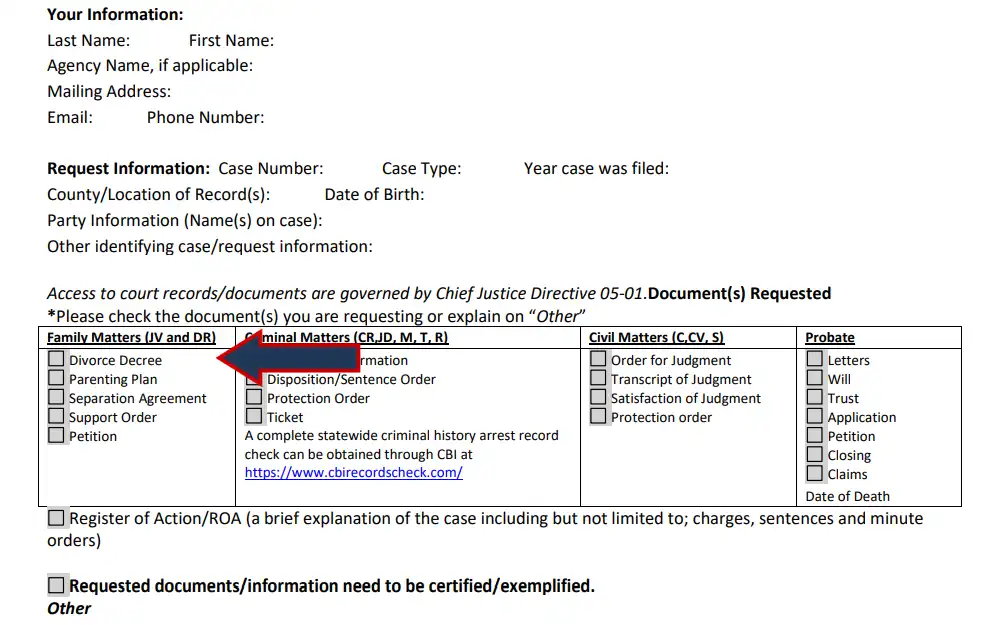
Also provide your name and contact information, along with the case number, case type, and county in which the divorce was processed. Fees vary and are listed at the bottom of the request form.
Mail your completed form and payment to:
Arapahoe Court
Attn: Records Requests
7325 S. Potomac St.
Centennial, CO 80112
Phone: 303-645-6814
You can also email your completed form to [email protected].
In Weld County, Colorado, you can search for divorce records using the free County Clerk & Recorder Self-Service Web Portal. Provide the document number, recording dates, names, grantor, and grantee, if known. From the Document Type drop-down menu, select Divorce Decree.
Click “search.” A list of available records will be provided.
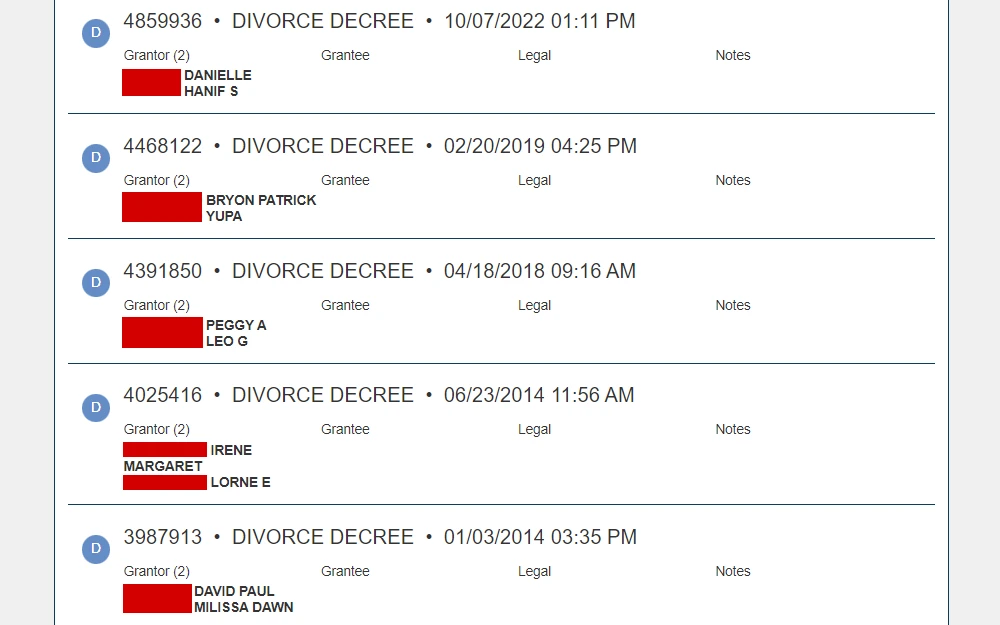
Check the box next to the record you’d like. You’ll then have the option to view or print these non-certified records.
Generally, cities in Colorado do not maintain their own divorce records. These records can instead be obtained through the county courthouse. Below, you’ll find some of the most popular cities in Colorado along with information about their divorce record holders.
In Colorado Springs, divorce records are maintained by the El Paso County Recording Department. The office is open to in-person visitors Monday – Friday between 8:00 am and 4:30 pm. Visit the office at:
El Paso County Recording Department
1675 West Garden of the Gods Road
Colorado Springs, CO 80907
Phone: 719-520-6200
In Aurora, Colorado, divorce record requests can be submitted to the Arapahoe County Court. Interested parties can fill out and mail a Record/Document Request Form to the following address:
Arapahoe Court
Attn: Records Requests
7325 S. Potomac St.
Centennial, CO 80112
Phone: 303-645-6814
In Denver, you can search divorce records through the Denver County Court’s website. The easiest option is to Search by Name.6
Enter the first name, last name, and date of birth of the person whose records you’re requesting. If the person was divorced in Denver County, related court records should be provided. Helpful insight can be found in the Denver County divorce lookup overview as well.
Finding Free Archived Divorce Records in CO for Genealogy Purposes
Interested parties can request records of divorces granted between 1992 and 2008 via the Colorado State Archives.7 From the drop-down menu, select “Divorce Records.” You’ll be asked to provide your email address.
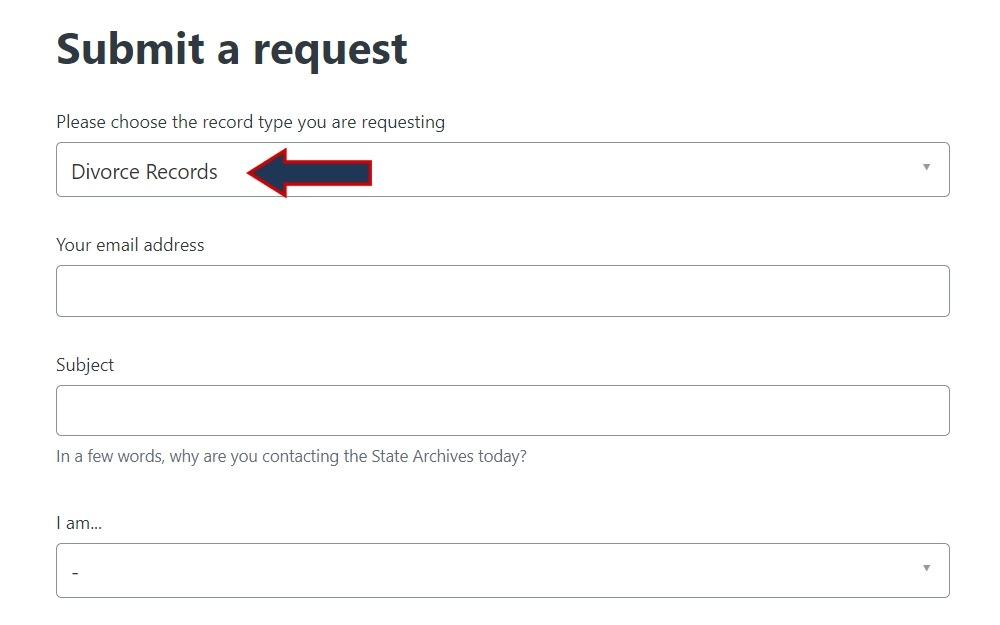
You’ll also need to select which documents you need: the decree only, the divorce packet, or the entire case file. Enter the case number and the date of the record, and provide your personal information towards the end of the form. Click “submit” to submit your request.
You’ll need to provide a picture of your photo ID along with payment. There is a fee of $32.50 per certified decree and a fee of $43.50 for the whole certified divorce packet. Uncertified copies of the decree are $20.50 each.
If you’re doing genealogical research, you may be seeking older, historic divorce records. In Colorado, such records are available through the Colorado State Archives.
The state archives do not have a complete collection of divorce records from all CO courts. However, they do have records from as early as 1899.
There are three ways to conduct a free public divorce records search through the Colorado State Archives. The first option is to search the Archives Search Database. Be sure to select “Record” from the category drop-down menu.
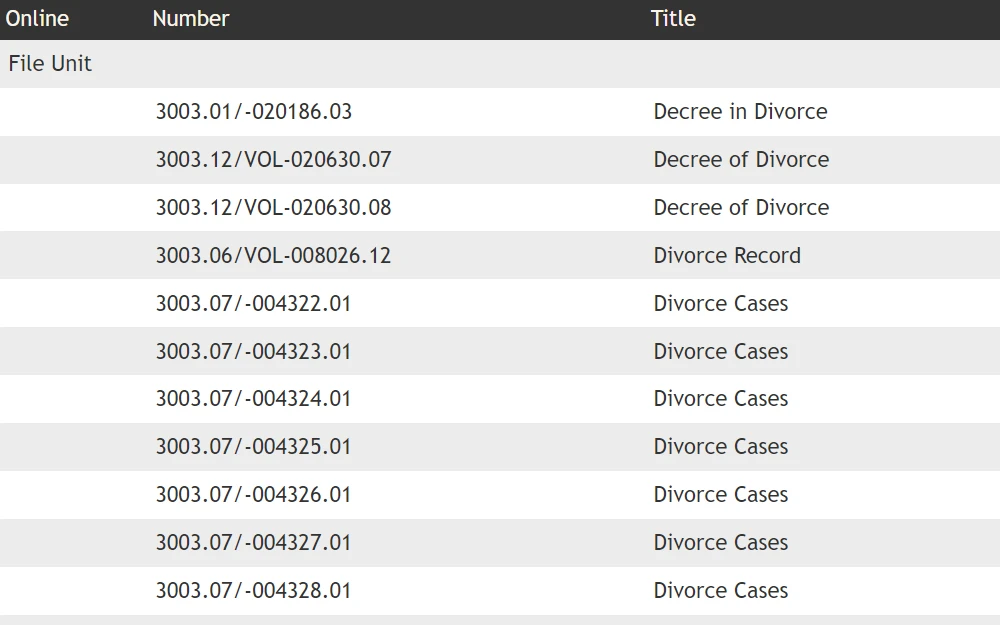
You can also submit a request via email. Or, you can use the email request form to schedule an in-person visit to the archives. The office is open by appointment, only, and is located at:
Colorado State Archives
1313 Sherman Street, Rm. 1B-20
Denver, Colorado 80203
Phone: 303-866-2358
Libraries are another good place to search for historical divorce records, annulment records, and related genealogical information in Colorado. In fact, the Denver Public Library maintains a Colorado Divorce Index of public divorce records dated between 1861 and 1941.9 This library also offers a variety of genealogical tools which you can use in person at:
Denver Central Library
10 W. 14th Ave. Pkwy.
Denver, CO 80204
Phone: 720-865-1821
Genealogical Societies can be another good source of information related to divorce and marriage records. The Colorado Genealogical Society partners with the Denver Public Library to offer genealogical research services. They can field small requests from visitors.
Contact their researchers at:
Colorado Genealogical Society
P.O. Box 9218
Denver, CO 80209-0281
Email: [email protected]
Is Colorado a State That Recognizes Common Law Marriages & Divorces?
Colorado does recognize common law marriages. Such marriages are established when both parties mutually consent to be wed. People can enter a common law marriage at the age of 16 with parental consent, or at the age of 18 without parental consent.10
If someone is in a common law marriage and wants to become divorced in Colorado, they can follow the same legal process as any other married couple. However, the court may require that they first show a marriage did exist. This may involve providing documents such as joint tax returns and insurance paperwork.
How To Access Information About Dissolutions of Marriage & Common Law Divorces in Colorado
If a person was granted a divorce following a common law marriage in Colorado, the records related to that common law divorce should be available via the Colorado Department of Public Health & Environment. You can use VitalChek to access these records online, or visit the department in-person at:
Colorado Department of Public Health & Environment
Vital Records Office
4300 Cherry Creek Dr.
South Denver, CO 80246
Note that the Vital Records Office is open by appointment, only. You can make an appointment on the CDPHE website.
In Colorado, the terms “divorce” and “dissolution” are used interchangeably. If a marriage was dissolved in the state, you should be able to find records of that dissolution via the CDPHE, as referenced above.
How To Apply for a Divorce & Respond To Divorce Notices in Colorado
To file for divorce in Colorado, you or your spouse must have lived in the state for 91 days or more before filing. You’ll need to file your divorce paperwork with the district court in your county. You and your spouse may file together, in which case you will fill out a Case Information Sheet and a Petition for Dissolution of Marriage.
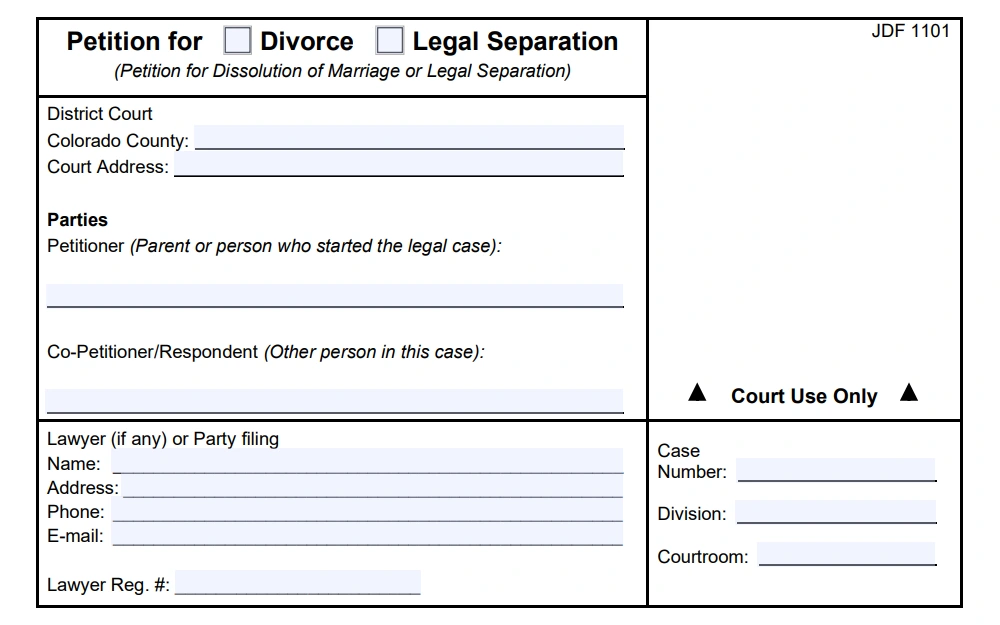
File these forms with the clerk at your county courthouse. You can also file these documents on your own. Your spouse will then be served the divorce paperwork.
If you are served divorce paperwork in Colorado, make sure you read through the information on the forms. Fill out the response form, and file it with your county court. It’s wise to work with a lawyer throughout this process.
Colorado offers no-fault divorces. This means you do not have to prove misconduct on the part of your ex-husband or ex-wife to be granted a divorce in Colorado.
Sometimes one partner is awarded alimony following a divorce in Colorado. This alimony may be temporary until both spouses are able to secure a steady income. Or, it may be permanent.
Permanent alimony is usually only awarded in extenuating circumstances, such as if one spouse is unable to work due to a chronic health condition. The court will often perform a divorce appraisal to determine whether alimony will be awarded.
Colorado is an equitable distribution state. As such, if you divorce your partner, your assets will not automatically be divided in half. Instead, the court will consider your circumstances and divide your assets in the way that seems most fair and equitable.
If you and your spouse have children, one of you may have to pay child support once the divorce is finalized. In Colorado, the court considers the relative ability of each parent to pay for support when determining the amount owed.
The fee to petition for divorce in Colorado is $230. There is an additional $116 fee to record a response to a divorce petition. Understanding the basics of divorce in Colorado is helpful, but make sure you also consult a qualified divorce attorney for legal advice.
As in many states, Colorado divorce records can be accessed via various online platforms, offices, and resources; the secret is knowing where to search; in addition to divorce details, searchers can also look up CO marriage details or perform a free Colorado public record search for insight into warrants, court cases, property taxes, and much more.
References
1United States Census Bureau. (2023, May 31). U.S. Marriage and Divorce Rates by State: 2011 & 2021. Retrieved November 28, 2023, from <https://www.census.gov/library/visualizations/interactive/marriage-divorce-rates-by-state-2011-2021.html>
2United States Census Bureau. (2020, January 15). U.S. Marriage and Divorce Rates by State: 2008 & 2018. Retrieved November 28, 2023, from <https://www.census.gov/library/visualizations/interactive/marriage-divorce-rates-by-state-2008-2018.html>
3Colorado Department of Public Health and Environment, State of Colorado. (n.d.). Order certificate now | Department of Public Health & Environment. Retrieved November 28, 2023, from <https://cdphe.colorado.gov/order-certificate-now>
418th Judicial District, Colorado Judicial Branch. (2018). Record Request Form 2018. Retrieved November 28, 2023, from <https://www.courts.state.co.us/userfiles/file/Court_Probation/18th_Judicial_District/Arapahoe/Record%20Request%20form%202018.pdf>
5Weld County Clerk & Recorder. (n.d.). Self Service: Document Search. Self-Service. Retrieved November 28, 2023, from <https://weldrecorder.weldgov.com/web/search/DOCSEARCH528S1>
6Denver County Court. (n.d.). Search Denver County Court. YouTube. Retrieved November 28, 2023, from <https://www.denvercountycourt.org/search/?searchtype=searchpayablebyname>
7Colorado State Archives. (n.d.). Submit a request – Colorado State Archives. Retrieved November 28, 2023, from <https://coloradostatearchives.zendesk.com/hc/en-us/requests/new>
8Colorado State Archives. (n.d.). Archive Results | Colorado State Archives. Retrieved November 28, 2023, from <https://archives-search.state.co.us/proficiowebmodule/MAResults.aspx?pS=Divorce$Record&sletter=TC&dS=&dletter=&alevel=ALL&dir=ARCHIVES>
9Denver Public Library. (n.d.). Denver Public Library Colorado Divorce Index 1861 – 1941. Retrieved November 28, 2023, from <https://history.denverlibrary.org/sites/history/files/1861-1941_CO_Divorces_0.pdf>
10Pitkin County. (n.d.). Common Law Marriage. Retrieved November 28, 2023, from <https://www.pitkincounty.com/288/Common-Law-Marriage#:~:text=The%20following%20are%20the%20only,of%20legal%20age%20(18).>
11Colorado Judicial Branch. (2023, February 3). Petition for Divorce Legal Separation. Retrieved November 28, 2023, from <https://www.courts.state.co.us/Forms/PDF/JDF1101.pdf>
